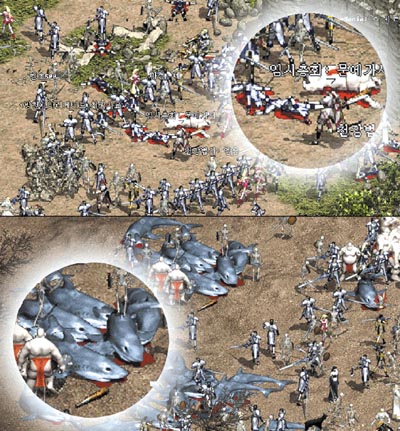
According to analysis provided this year from the Korea Game Development and Promotion Institute, the subscription-based game Lineage, created by NCsoft corporation was noticeably more violent and addictive than any other foreign online games.
Lee Eun-jung (English Language and Literature, 3) agrees, saying, "I think most players of Lineage would agree that the game has very violent elements to it. I have seen many people slaying and killing other characters in the game, just for the fun of it, even when it is not required."
Despite this, it is said that the game takes up over 50 percent of the total online game market in Korea with over an estimated 2 million users (statistics from September, 2000 by the Korea Game Development and Promotion Institute).
Nor is it only Lineage which seems to attract players in spite of or perhaps even because of its violent content.
Grand Theft Auto (GTA), for instance, is another game that has caused much controversy. The Media Rating Board has banned the game in Korea for its lewd and violent content, which involves a car thief freely running people over and picking up prostitutes in seedy parts of the town. Soon, his car starts shaking wildly, and once the thief is through, he kills the prostitute. He is left with less money but his energy is full. Although GTA is not an online game and the software is not available in Korea, it is found in free downloadable format in various game-related cyber communities and sites.
According to a survey carried out this month in one of the classes by Professor Han Sang-man (Business Administration) of Sungkyunkwan University, 52 percent of students thought GTA was too violent and 33 percent believed the game confused reality and fiction. About 85 percent of the class responded that it was due to the game"s realistic features.
In other words, the class concluded the game allows the players to experience a certain catharsis by releasing aggression that is forbidden in reality but permitted in the game. Or as one writer wrote on the community board at a GTA fansite (http://www.gta3.co.kr), "My favorite parts of the game honking the car horn and picking up a prostitute, kicking her to death, and running over cops as they make a squashing sound."
Are these games merely cathartic ways of releasing aggression? The danger lies in the fact that they are not merely so. According to Professor Yang Yoon (Psychology), "There are two potential consequences resulting from the influence of the violence in such games. One is simply cathartic, meaning the players release their violent desires through the game. The other potential behavior is what we call "imitation" which refers to carrying out the violent sensations indirectly experienced in the game, into actual actions in reality. Out of these two potential behaviors, it has been proven that the latter is more likely to occur in players of such games."
To put it in simple terms, the more players indulge in cyber violence, the more likely they are to practice that violence in real life.

